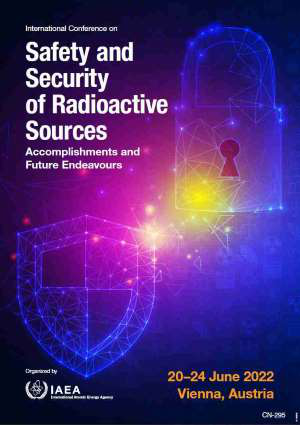The purpose of the conference is to foster the exchange of experiences and anticipated future developments related to establishing and maintaining a high level of safety and security of radioactive sources throughout their life cycle.
The conference will provide a forum to:
- Exchange information on meeting current challenges relating to the safety and security of radioactive sources, including lessons learned during the COVID 19 pandemic;
- Increase awareness about and exchange experience regarding preparedness for and response to radiological incidents and emergencies involving radioactive sources;
- Foster coordination among national competent authorities for the safety and security of radioactive sources;
- Share experiences in the development of governmental (e.g. policy and strategy), legislative and regulatory frameworks for radioactive sources and associated facilities;
- Exchange information regarding the planning, establishment, maintenance and sustainability of national radiation safety and nuclear security regimes for radioactive sources, including safety and security systems for facilities and activities (other than transport), as well as knowledge management, education and training;
- Review the impact of research and technological advancements relating to future applications of nuclear sciences and technologies on safety and security of radioactive sources; Share experiences in technological advances and future planning for establishment, maintenance and sustainability of safety and security measures;
- Facilitate cooperation among all competent authorities and other stakeholders at the national and international levels, as applicable;
- Promote IAEA safety standards and nuclear security guidance, and their use by States;
- Promote the universalization and use of relevant legally binding (e.g., , Joint Convention of the Safety Spent Fuel Management and on the Safety of Radioactive Waste Management – “Joint Convention”, Convention on Assistance in the Case of a Nuclear Accident or Radiological Emergency – “Assistance Convention”, and International Convention on the Suppression of Acts of Nuclear Terrorism – ICSANT) and non-legally binding (e.g. Code of Conduct on the Safety and Security of Radioactive Sources and its supplementary guidance) international instruments.
The conference will not address the safety and security of nuclear material in use, transport and storage, nor the response to related nuclear security events. Further, the conference will not discuss any sensitive nuclear security information and issues of a political nature. The safe and secure transport of radioactive sources will be addressed separately during the IAEA “International Conference on the Safe and Secure Transport of Nuclear and Radioactive Materials” (CN-280), to be held in Vienna on 12-17 December 2021, which will inform the conference.
-
01. Legally binding and non-legally binding international instruments (e.g., Code of Conduct on the Safety and Security of Radioactive Sources) and national legal frameworks
-
02. Coordination among stakeholders involved in the safety and security of radioactive sources
-
03. Interface between relevant stakeholders in relation to imports and exports of radioactive sources
-
04. Regulatory infrastructure for the safety and security, including Emergency Preparedness and Response (EPR), of radioactive sources
-
05. Harmonized regulatory approaches (e.g., authorization, inspection and enforcement processes) for the safety and security of radioactive sources
-
06. Functions, competencies and effectiveness of regulatory bodies
-
07. Regulatory requirements for safety and security of radioactive sources and associated facilities, including EPR
-
08. Graded approach to national regulatory requirements for safety and security of radioactive sources
-
09. Assessment of current and emerging threats, hazards and risks related to radioactive sources
-
10. Safety and security assessments of facilities and activities;
-
11. Self-assessment tools for the safety and security, including EPR, of radioactive sources
-
12. Sustainability and effectiveness of safety and security systems and measures, including emerging technologies
-
13. Challenges and good practices associated with ensuring the safety and security of radioactive sources throughout their life cycle
-
14. Safe and secure management of disused sealed radioactive sources, including field operations, new technologies and end-of-life-cycle management options
-
15. Successes and challenges in transitioning from source-based to non-source-based radiation technologies
-
16. Lessons learned from managing radioactive sources safely and securely during the COVID-19 global pandemic
-
17. Radioactive sources security and safety by design
-
18. Physical protection systems and measures at facilities
-
19. Information security, including computer security, in relation to radioactive sources
-
20. Responding to radiological incidents and emergencies involving missing, lost or stolen radioactive sources
-
21. Radioactive sources out of regulatory control and illicit trafficking prevention
-
22. Good practices for notification, reporting, exchange of information and requests for assistance in case of radiological incidents and emergencies (e.g, using IAEA’s Unified System for Information Exchange “USIE”)
-
23. Emergency response exercises and their evaluation
-
24. Raising awareness of industry, civil society, international organizations and other stakeholders about the safety and security of radioactive sources, including sustainability and resilience in unplanned situations (e.g., pandemics and natural disasters)
-
25. Human resources development, knowledge management and networks, education and training
-
26. Safety culture and nuclear security culture for radioactive sources
-
27. International cooperation and assistance to enhance the safety and security of radioactive sources
-
28. IAEA peer review and advisory missions, e.g., Advisory Mission on Regulatory Infrastructure for Radiation Safety and Security of Radioactive Material (RISS), Integrated Regulatory Review Service (IRRS), International Nuclear Security Advisory Services (INSServ), International Physical Protection Advisory Service (IPPAS), and Emergency Preparedness Review (EPREV)

